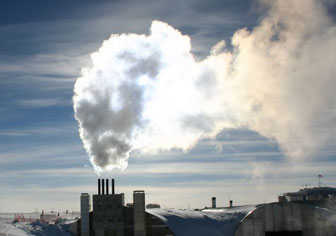U.S. refuses to talk global warming cuts at G8 summit
U.S. refuses to talk global warming cuts at G8 summit
mongabay.com
June 6, 2007
President Bush said he opposed setting firm targets for greenhouse gas cuts at a G8 summit but said that his proposal to fight climate change would not undermine U.N. efforts, as critics have claimed.
Bush told German Chancellor Angela Merkel he had a “strong desire” to eventually develop a plan for slowing global warming, reports Reuters.
Last week Bush announced his global warming plan which consisted of calling for meetings between the 15 leading emitters of greenhouse gases. The U.S. has refused to agree to emissions cuts in previous international conferences.

Image courtesy of the Lawrence Berkeley National Laboratory. |
Environmentalists and many European nations have blasted Bush for his apparent foot-dragging on addressing climate change. The U.S. is presently the largest producer of greenhouse gases, though China is expected to surpass it this year or next.
In May a study showed rapid growth of global carbon dioxide emissions and stagnation of gains in carbon intensity, the amount of carbon required to produce a unit of economic output, since the close of the 1990s. After a long rise in carbon efficiency, the Proceedings of the National Academy of Sciences study found a reversal in the trend.
“Despite the scientific consensus that carbon emissions are affecting the world’s climate, we are not seeing evidence of progress in managing those emissions in either the developed or developing countries. In many parts of the world, we are going backwards,” said Chris Field of the Carnegie Institution’s Department of Global Ecology and a co-author of the study. “The trends relating energy to economic growth are definitely headed in the wrong direction.”
Bush first prominently acknowledged the threat of climate change during his 2007 State of the Union Address address, when he called it a “serious threat.”
Recent popular articles
Globalization could help save the Amazon

|
(06/04/2007) The Amazon basin is home to the world’s largest rainforest, an ecosystem that supports perhaps 30 percent of the world’s terrestrial species, stores vast amounts of carbon, and exerts considerable influence on global weather patterns and climate. Few would dispute that it is one of the planet’s most important landscapes. Despite its scale the Amazon is also one of the fastest changing ecosystems, largely as a result of human activities, including deforestation, forest fires, and, increasingly, climate change. Few people understand these impacts better than Dr. Daniel Nepstad, one of the world’s foremost experts on the Amazon rainforest. Now head of the Woods Hole Research Center’s Amazon program in Belém, Brazil, Nepstad has spent more than 23 years in the Amazon, studying subjects ranging from forest fires and forest management policy to sustainable development. Nepstad says the Amazon is presently at a point unlike any he’s ever seen, one where there are unparalleled risks and opportunities. While he’s hopeful about some of the trends, he knows the Amazon faces difficult and immediate challenges.
Polynesians brought chickens to Americas before Columbus
|
|
(06/04/2007) New DNS analysis shows that Polynesians introduced chickens to South America well before Christopher Columbus first set foot in the New World. The evidence supports the theory that the Americas were visited by sea-faring groups from the East prior to the arrival of Europeans. Using carbon dating and analysis DNA to determine the origin of chicken bones discovered at El Arenal, an archaeological site in Chile, a team of researchers led by Alice Storey of the University of Auckland found that the birds were descended from Polynesian stock and were introduced at least 100 years before the arrival of Europeans on the continent. The findings undermine claims that chickens were native to South America or that they were introduced by Spanish or Portuguese explorers.
[
Ancient civilizations]
24 species discovered in Suriname

|
(06/04/2007) Scientists documented 467 species, including 24 species believed new to science, during a rainforest survey in eastern Suriname, South America. The expedition, led by Conservation International (CI), was sponsored by two mining companies, BHP-Billiton Maatschappij Suriname (BMS) and Suriname Aluminium Company LLC (Suralco), hoping to mine the area for bauxite, the raw material used to make aluminum. Conservation International said the Rapid Assessment Survey (RAP) will help “give miners guidance on protecting unique plants and animals during potential future development,” according to a statement from the organization.
[
Species discovery | Suriname]